Healthy hair starts with a healthy scalp. A healthy scalp is free from redness, inflammation, and itchiness and provides a good growing base for the hair. How you wash your scalp and the products you use greatly determine the health of your hair.
To grow healthy hair, ensure your scalp microbiome is healthy. Interestingly, balancing all the microorganisms on the scalp – scalp microbiome – is the biggest secret to a healthy scalp and hair. Washing the scalp frequently using the correct products, hydrating the scalp, taking vitamin D supplements, and scalp massaging will make healthy hair growth.
Table of Contents:
- Part 1: Essential Factors for Healthy Scalp
- Part 2: Top Tips for a Healthy Scalp
- Part 3: Importance of Scalp Health
- Part 4: Best Products for Enriching the Scalp
-
Part 5: When to See A Medical Dermatologist
Essential Factors for Healthy Scalp
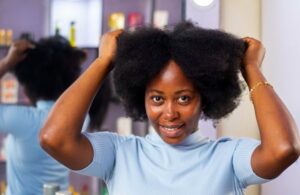
A scalp rich in nutrients, free from inflammation, and healthy promotes the growth of strong healthy hair. The four essentials of healthy hair include the absence of inflammation, which determines hair health and growth. The second factor is the balance of oil production or sebum production. Sebum is produced by the oil glands, and the same glands are related to the hair follicles.
Another essential hair growth factor is the absence of flakes and scales. These are detrimental to hair growth. Flakes and scales are caused by skin conditions such as dermatitis, eczema, and psoriasis, resulting in excess hair on the scalp. This results in the strangulation of the hair itself, and hence, the nutrients for the hair root and shaft are diminished.
A viable microbiome is another hair growth factor. The scalp microbiome is the ecosystem surrounding hair follicles. In the case of seborrheic eczema or dandruff, there’s an excess of fungal or Yeast elements called malicious. This excess of microorganisms is detrimental to the scalp’s health.
Top Tips for a Healthy Scalp
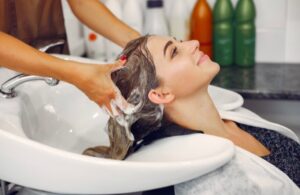
To many, the skin on the head is given the least consideration in our daily hair care routines yet largely determines the hair’s health. Simple scalp care routines such as shampooing gently and using your fingertips to massage the scalp will improve your scalp health.
Here are the top tips to improve your scalp health.
1. Washing Frequently
While you shouldn’t wash the scalp every day, the frequency should be rationally balanced, considering your hair type, lifestyle, and scalp condition. Remember, overwashing the scalp scraps natural oils and leaves the scalp dry. On the contrary, underwashing leads to excessive oil buildup on the scalp.
If you’ve got an oily scalp, it’s recommended you wash it every day or after every few days. But if it’s normal, washing after every 2-3 days is good. A dry scalp should be washed 2-3 times a week.
The washing technique you use also determines the scalp’s health. When washing the scalp, use lukewarm water, as hot water causes excessive dryness and strips off the scalp’s natural oils.
While using shampoo, gently massage the scalp with the fingertips. This promotes gentle exfoliation of scales, buildup debris, and oil. More importantly, it promotes blood circulation which stimulates healthy hair growth.
Next, rinse the hair and scalp thoroughly to prevent product buildup.
2. Use Hair Care Products
 When using hair care products, avoid products with ethanol, sulfates, and fragrance because they can dry out the scalp. Fragrances can also lead to allergies, which worsen inflammation and, hence, scratching. Fragrances also impair the functioning of the scalp.
When using hair care products, avoid products with ethanol, sulfates, and fragrance because they can dry out the scalp. Fragrances can also lead to allergies, which worsen inflammation and, hence, scratching. Fragrances also impair the functioning of the scalp.
You should also avoid harsh hair care products such as dye and bleach. They damage the hair shaft and the scalp.
3. Exfoliate the Scalp
Exfoliating the scalp removes buildup chemicals, dead cells, and dirt. Use scalp scrub to exfoliate the scalp skin. It’s good to use a scrub with a chemical exfoliant to help remove dandruff and excess scalp oil which leads to an unhealthy scalp. A gentle scalp scrub can also dilute the blood vessels on your scalp skin, boosting hair growth.
4. Eat the Right Nutrients
 Which nutrients do you eat to make the scalp healthy? It’s good to eat foods rich in vitamins A, B12, and B2 depending on your general body health. Diet has been established to help with many different skin conditions including scalp health. A 2015 study showed that omega-3 fatty acids which include fish oils improve circulation in scalp health.
Which nutrients do you eat to make the scalp healthy? It’s good to eat foods rich in vitamins A, B12, and B2 depending on your general body health. Diet has been established to help with many different skin conditions including scalp health. A 2015 study showed that omega-3 fatty acids which include fish oils improve circulation in scalp health.
Consumption of fish oils leads to the robustness of hair follicles and a decrease in hair shading. Additionally, a diet high in antioxidants for example fruits, leafy green vegetables, and fish can reduce the amount of oxidative stress on hair follicles and promote hair growth.
Again, probiotics (foods containing live microorganisms such as yogurt and cottage cheese) help in normalizing the microbiome of the scalp and, hence, prevent the overgrowth of yeast. Overgrowth of yeast is implicated in certain conditions such as dermatitis.
Importance of Scalp Health

Anything likely to affect your scalp health will also affect your hair health. Though not a very tedious routine, it’s important to maintain a healthy scalp for the following reasons.
1. Boosts Hair Growth
A healthy scalp provides a conducive environment for the hair follicles to grow. A clean and well-nourished scalp encourages proper circulation and delivery of nutrients to the hair follicles and hence supports hair growth. According to a 2018 study, the scalp condition determines hair growth and retention.
2. Oil Regulation
A healthy scalp produces sebum, a natural oil that moisturizes hair. A healthy scalp keeps sebum production balanced. Excessive sebum production makes the hair greasy, while low sebum production makes the scalp dry, which leads to irritation and dandruff.
3. Cleansing
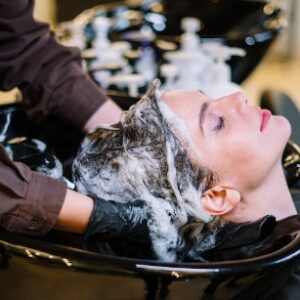 You’ll need to cleanse the scalp regularly to remove dirt, excess oil, and sweat to have a healthy scalp. It also helps remove product buildup on the scalp, prevents clogging of hair follicles, and promotes a healthy hair growth cycle.
You’ll need to cleanse the scalp regularly to remove dirt, excess oil, and sweat to have a healthy scalp. It also helps remove product buildup on the scalp, prevents clogging of hair follicles, and promotes a healthy hair growth cycle.
4. Prevent Dandruff and Irritataion
A balanced PH scalp level and environment will help prevent scalp conditions like dandruff, inflammation, and irritation. Poor scalp health is associated with dandruffs, which may cause premature hair loss.
5. Maintain PH Level
The scalp’s PH level is about 5.5, which is more basic. Keeping the scalp healthy equals maintaining a steady PH balance. Allowing products to disrupt the scalp PH will result in frizzy hair, while a balanced PH keeps the scalp moisturized.
Best Products for Enriching the Scalp
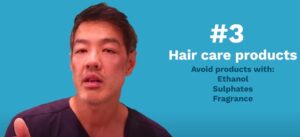
The best scalp products should soothe, and moisturize the scalp if dry, or enrich the scalp with nutrients. While some contain anti-dandruff, others are formulated to cleanse and remove chemical buildup on the scalp. Among the hair care products to use on the scalp are:
1. Shampoo
Choose shampoos that match your hair type and scalp condition. The best shampoo will help deeply cleanse the scalp and remove excess oil. Using those infused with antioxidants makes the hair grow more healthy. Dermal Therapy shampoos contain ingredients that soothe and moisturize the scalp.
2. Conditioners
Conditioners are good at maintaining moisture balance in the hair. Apply the conditioner to the lengths and ends and avoid the scalp if it’s oily. If you’ve got dry hair, using conditioner will help moisturize and soften the hair strands
When to See A Medical Dermatologist
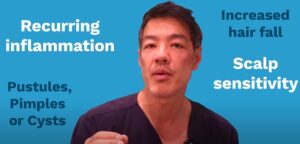
If you suffer from the following conditions, consult a medical dermatologist.
-
-
- Recurring inflammation
- Scalp sensitivity
- Pustules, cysts, and pimples
- Increased hair fall
-
Conclusion
To get healthy hair, ensure your scalp is healthy. A healthy scalp boosts hair growth, balances the scalp’s PH level, and regulates oil production. The first step to growing healthy hair is washing the scalp frequently as you massage it. Using the correct hair care products will also make your hair grow dense and healthy.

 By myulikeadmin
By myulikeadmin



